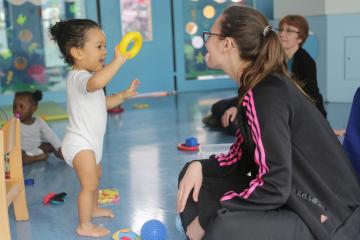
J-PAL at 20: Promoting more inclusive education in Italy

How can we ensure that students from all backgrounds can achieve their academic potential? This blog post, the first in a series exploring J-PAL's research and activities across Europe, looks at a series of randomised evaluations in Italy that explore this question with a particular focus on students from immigrant families. As school systems across Europe welcome increasingly diverse populations, this research provides insights into pathways for transforming students’ educational aspirations and academic performance, as well as their well-being.
Schools play an integral role in promoting social inclusion. They aim to provide students with a range of skills that can equip them for success in further study and employment, as well as for broader participation in the economic and social life of their communities. Addressing exclusion in schools can therefore play at least two important roles, by removing barriers for students from disadvantaged backgrounds to realise their full academic potential and by establishing norms around equality and inclusion that shape students’ participation in their communities now and in the future.
Recent research by J-PAL affiliated professors in Italy has evaluated how discrete interventions can shift academic trajectories and well-being by either transforming the perceptions and practices of teachers or providing students with additional information and resources. These studies were led by J-PAL affiliated professors Michela Carlana (Harvard University), Eliana La Ferrara (Harvard University), and Paolo Pinotti (Bocconi University), along with coauthors including the late Alberto Alesina and Marinella Leone (University of Pavia).
This work has largely focused on the crucial middle school years, when students in Italy, as is common across Europe, must make important choices about whether to pursue academic or vocational high school tracks. This choice has significant consequences for employment outcomes later in life.
Identifying effective measures for tackling social exclusion is a primary focus of the J-PAL network’s research in Europe. This involves a focus not only on households in poverty but also those at risk of poverty or exclusion more broadly from the economic and social life of their communities. The European Social Inclusion Initiative was launched in 2019 to support more rigorous research in this field, and researchers in our network have sought in particular to identify ways in which educational interventions can help break the intergenerational transmission of social exclusion.
Documenting and addressing the impact of teacher bias in Italian schools
One strand of this work has documented the harmful role that teacher biases can play and showed that simply making teachers aware of these biases can contribute to removing barriers to achievement.
Alesina, Carlana, La Ferrara and Pinotti found that more than two-thirds of teachers in a sample of Italian schools exhibit moderate to severe bias against immigrants, as revealed by an implicit association test. This can affect student grading—when examining students of similar ability, as reported on national standardised exams, math teachers with higher levels of bias were more likely to grade immigrant students more harshly than Italian students. In separate work, Carlana found that female students assigned to math teachers with biased views of girls’ abilities not only received lower math scores but also chose not to pursue more demanding educational tracks and reported lower self-esteem.
To test the effect of providing teachers with information on their implicit bias, the researchers randomly varied the timing of this information: either before or after reporting end-of-semester grades. They found that receiving this information leads teachers to give immigrant students higher grades and that this shift appears to be driven by teachers who may have been unaware of their bias.
The potential of counselling and tutoring support
If addressing teacher bias appears to be one important element in addressing barriers for students, another part of the solution lies in providing students with additional out-of-classroom resources. Two evaluations of counselling and tutoring interventions show that these can shift students’ academic performance and aspirations.
Carlana, La Ferrara and Pinotti evaluated a programme in Italian middle schools that helped high-achieving immigrant boys better align their high-school track choices with their abilities. They found that male students from immigrant backgrounds were more likely than native-born Italian counterparts of similar abilities to enrol in vocational rather than technical or academic-track high schools (the same was not true for girls). They examined whether a programme that combined career counselling and additional tutoring could help address this gap. Drawing on social cognitive career theory, the counselling was designed to make students aware of their skills, available opportunities, and to develop career aspirations in line with those abilities. They also received additional tutoring if their performance was below a set threshold.
Boys who participated in the programme reported greater confidence and saw fewer barriers to academic success; they performed better on a standardised test in 8th grade and were as likely as native Italian students to select academic or technical high-school tracks. Participation in the programme also shifted teacher perceptions of these students, as they became more likely to recommend them for the higher track.
One key finding from the study is that the academic aspirations of high-achieving boys in middle school are malleable, as are their teachers’ perceptions of their academic potential. In considering how to potentially scale the intervention, the researchers have explored how to potentially reduce the costs. One path is to provide the counselling arm through in-school psychologists, but in many education systems, there is a limited pool of such staff and they face many existing demands on their time. An alternative path could be to explore whether volunteers with more limited professional training could deliver a version of this counselling and still generate similar impacts? This is an important question for further study.
A second study by Carlana and La Ferrara examined the impact of online tutoring when Italian schools first closed in response to the Covid-19 pandemic. The programme targeted middle school students from disadvantaged backgrounds who had been identified by principals as at risk of falling behind during online learning. Volunteer tutors drawn primarily from teaching training programmes provided these students with an average of three to six hours of individual tutoring per week online.
An average exposure of six weeks to the programme translated into significantly higher student effort and improved test scores. Tutored students also reported higher aspirations and participation improved their overall well-being: they reported a greater degree of control over events in their lives and fewer symptoms of depression. This improvement in well-being was driven largely by students from immigrant backgrounds.
The authors are now exploring in a series of follow-up evaluations how to most efficiently deliver impactful tutoring, as well as to investigate impacts on standardised test scores.
The classroom as a model for building inclusive environments
Tackling the exclusion of children in the classroom may be not only a way to improve academic outcomes for students from different backgrounds; it might also be a way to build more cohesive communities. Carlana has partnered with J-PAL affiliated researcher Sule Alan (European University Institute) and their coauthor Marinella Leone (University of Pavia) to explore how a teacher training programme focused on developing socio-emotional skills might foster both academic achievement and more inter-ethnic cohesion. The researchers have worked with a team of cognitive scientists at the University of Pavia to design a pilot intervention in primary schools where ethnic diversity is salient. This research is expected to provide further insight into ways to create inclusive classrooms where teaching practices can promote achievement for all, as well as give children the social skills that promote cohesive communities.
Directions for future research on education in Europe
School systems across Europe are seeking ways to ensure that classrooms with students from an increasingly diverse range of backgrounds can promote the academic success of all students and give children the skills for building strong and cohesive communities in the future. These studies provide valuable insights for designing more inclusive education across Europe (and beyond). Their findings join existing research from France, which has shown that providing students and families with additional information on schooling can help them align their aspirations with their abilities, as well as research from Turkey that has shown how teaching focused on promoting understanding can create more inclusive classrooms with better academic outcomes for non-native students. The findings on the positive effects of tutoring form part of a growing body of evidence on the potential for tutoring to improve academic outcomes in primary and secondary education.
To extend and leverage these findings, European educators may wish to adopt and adapt some of the building blocks identified here. Giving teachers information about their implicit biases is likely to be a relevant tool in many other settings in Europe, and there are likely ways to strengthen and complement the effect of this information. The success of the Equality of Opportunity Programme in helping immigrant students align their aspirations with their abilities invites further study of how this could be scaled at reasonable costs. It also invites further innovation into whether other interventions could achieve the same aims, and among different populations (such as for non-immigrant students from disadvantaged backgrounds). Finally, finding ways to provide more cost-effective tutoring remains an important area for research. Carlana and La Ferrara are continuing to explore these in Italy and further afield. At J-PAL Europe, we are also happy to help educators across the continent consider how to build upon and adapt the promising findings discussed above to evaluate new solutions.
Related Content

Improving Educational Outcomes through Online Tutoring during Schools Closures in Italy during the Covid-19 Outbreak

J-PAL Europe launches IDEE to advance evidence generation and use in the French education system

